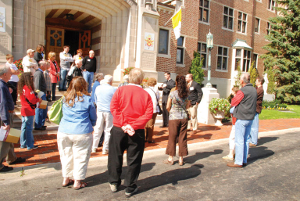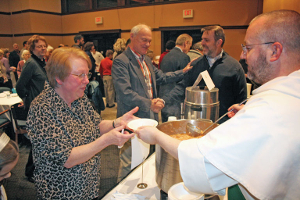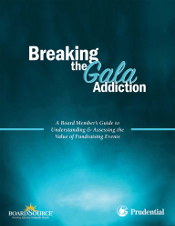With their ball gowns and white ties, raffle tickets and silent auctions, fundraising events are the pillars of fundraising programs at many theological schools. Nevertheless, while focusing on mission and stepping up donor cultivation, leaders at Pontifical College Josephinum — a Catholic seminary in Columbus, Ohio — have been reevaluating their approach to events.
In Trust recently interviewed Carrie Burson, director of development, to ask what she’s been learning.
When you began your work as development director, what special events were being hosted by the seminary?
Back in 2008 we had two campus tour days, an Irish Fest, a jewelry sale, the Rector’s Dinner, and two luncheons by the Jessing Society, our planned giving society. In 2010, we added the Good Shepherd Dinner.
Can you detail the cost analysis that led you to reexamine some events?
First, we had to decide which events were fund-raisers and which were primarily friend-raisers. We saw all our events as a way to introduce us to the community, but when we studied our results, we found that some events weren’t actually accomplishing that goal.
One example was our Irish Fest, an event modeled on a parish festival. We examined the total costs. It was raising $10,000 a year, but the advancement office spent a month planning that event.
In contrast, we know that if you talk to potential donors about a specific cause, you can sometimes get that amount in a single sit-down meeting rather than after a month’s work.
What feedback did you get from the board, the president, and your community when the Irish Fest was put on hiatus?
The Irish Fest board committee had made the decision to suspend the event due to nearby road construction. It was good that it came from the committee. Because the people who were attending the Irish Fest maybe weren’t as engaged in the Josephinum community as we would have hoped, there hasn’t been a big backlash.
I firmly believe that every event has a shelf life. Some people in the seminary world say, “This is what we’ve always done,” but that is why it’s so important to reevaluate events once in a while — to ask yourself, “Is this doing what we said it was going to do?”
What is the importance of focusing on mission when it comes to the events you have — or events that you’re planning?
We need to make sure that all the events that we’re doing are mission-driven. Sometimes events can be person-driven — promoted and organized by one individual who feels strongly about it. But those events are hard to maintain after that individual moves on.
Now we’re trying to focus all our events on seminarians because, from what I’ve seen, the people who are really invested in our mission care about making great priests. Our donors have a lot of interest in supporting the future of the Catholic church. Because of that, they are invested in what we do.
We have seminarians share their vocation stories at the Rector’s Dinner every year. At the last dinner, I was so inspired — their stories reminded me why I’m doing what I’m doing. I’m hoping that they resonated with the rest of the crowd as much as they did with me.
 |
| At the Josephinum, the development staff is clear about the purpose of events. Tour Day is a friend-raiser. Clergy Who Cook (below, right) is a fundraiser, but it works as a friend-raiser too. The Good Shepherd Dinner is a donor recognition event. |
What’s the difference between a friend-raiser and a fundraiser?
A friend-raiser is an event that gets donors in touch with your seminary. The big one that we do now is our Tour Day. We open the doors for a campus tour, and we capture information for our mailing list and ask if they want to continue to be involved.
Obviously a fundraiser is about making as much money as possible. The best events have a little bit of both. For example, our Rector’s Dinner is our biggest fundraiser of the year, but the people who buy tables bring new people who can become interested in the mission of the Josephinum. We hope these new friends will become more engaged.
Tell us more about your Clergy Who Cook event.
I actually borrowed that idea from the Youngstown Diocese. We ask priests in the Diocese of Columbus to come with their culinary masterpieces, bringing 250 sample-sized portions. The attendees pay for entry to the event, and then they sample all of the different cuisines that the priests have prepared. Next they vote for their favorites by placing dollars in a jar at each priest’s station. At the end of the night, whoever has the most money in his jar wins the People’s Choice award.
The priests get excited about the event because there are some fun rivalries. The parishes are excited about supporting their priests. The event benefits the Friends of the Josephinum, who raise money for needy seminarians, so the Diocese of Columbus is happy to benefit these future priests as well. It’s a win-win.
The Clergy Who Cook events sells out within a week every year. And two donors who have given more than $10,000 were introduced to the Josephinum through that event. It’s a great fundraiser, but it’s an effective friend-raiser too.
After an event, what steps do you take to measure its success?
We track details. For example, our revenue at the Clergy Who Cook event was down just a bit this year. We think it’s because  we sold tables to the event rather than individual entry tickets, and, as a result, attendees weren’t putting as much in the People’s Choice buckets.
we sold tables to the event rather than individual entry tickets, and, as a result, attendees weren’t putting as much in the People’s Choice buckets.
When we started tracking how many names were added to the database after each friend-raising event — and how much money each new friend donated after three years — we found that it was eye-opening. That information is very helpful.
What questions do you think should be asked before planning an event?
Each event needs to have a specific purpose. And you have to make sure that once the event is over, you know whether you achieved that purpose. It’s really easy to say, “If we have a gala, we will bring in more money.” But to know how much the event is bringing in, and to take into account the time of staff and volunteers who could be raising money in other ways — that’s crucial. Even managing volunteers takes a lot of time.
Another question to ask: Are you introducing new donors to your institution? Are they becoming engaged? Or are you adding the names of people to your database who are never going to care about the mission of your institution?
At our Good Shepherd Dinner, we found that the purpose of the event had become confusing. It had been envisioned as a way to thank donors, but we were charging people to attend, and we were soliciting ads for the program.
After three years, we decided to clarify the purpose. We made the dinner just a donor recognition event. I was sitting at a table with some of our long-term donors, who were asking, “How much do we owe you for this?” They were so pleased when I replied, “This is just to say thank you.”
What is a good way to improve the communication between the board and the development office?
Our advancement office reports to the board regularly every month, and we invite the board advancement committee to attend the development and planned giving council meetings as well. In the past, there were times when the board wasn’t being informed about the advancement office. It’s important to tell them everything that the advancement office is doing — not just “Look how great we’re doing!” The advancement office should be able to say the things that we’re struggling with.
Can a lack of good communication make the seminary’s leadership want to do more events out of desperation?
Absolutely, and that’s the last thing you want to do, because then your whole staff is stressed out about planning events rather than doing donor cultivation.
Are you considering any new events?
No, I’m very happy with the balance of events and other advancement activities. That’s not to say that I’m opposed to hearing people’s ideas and considering them in the future!
Now, watch, tomorrow they’re going to tell me we’re having a golf outing and I’m going to have to reevaluate my answer [laughter].
Cooking too much at once? You can cut back!
Breaking the Gala Addiction: A Board Member’s Guide to Understanding and Assessing the Value of Fundraising Events offers insight into evaluating the efficacy of fundraising events.
 This BoardSource resource emphasizes that all of the costs of event planning must be examined closely, including staff time, managing volunteers, and marketing costs. It focuses on development staff and board collaboration, effective fundraising strategies for galas, and emerging trends in special event fundraising, and it also offers an overview of the board’s role in institutional advancement.
This BoardSource resource emphasizes that all of the costs of event planning must be examined closely, including staff time, managing volunteers, and marketing costs. It focuses on development staff and board collaboration, effective fundraising strategies for galas, and emerging trends in special event fundraising, and it also offers an overview of the board’s role in institutional advancement.
On page 20, Breaking the Gala Addiction offers a few salient questions for board members to ask as they evaluate events:
-
Did the gala achieve the objectives the organization set forth, including its financial goals?
-
Did the event draw the constituents the organization hoped would attend?
-
Did staff and board members fully leverage opportunities to engage new and existing corporate and individual donors?
-
Were the expenses associated with the event appropriate and reasonable, given the level of funds generated?
-
Was the staff time involved more or less than anticipated, and what was the impact on staff members’ other fundraising and program responsibilities?
-
Are the funds generated being used to leverage the mission of the organization, as was described to event attendees?
-
And most important, was the gala worth the time, expense, and effort?
By highlighting tough questions about event planning, Breaking the Gala Addiction hopes to encourage nonprofit organizations to have meaningful conversations about institutional advancement. By empowering school leadership to rethink special events, nonprofit boards can hopefully strengthen their development strategies and create brighter financial futures.
— Regina Raiford Babcock